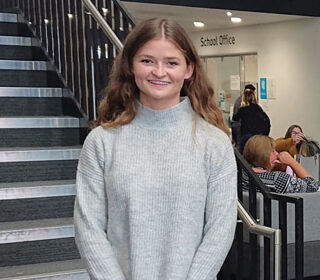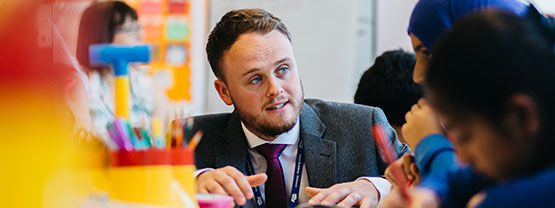
Opinion

Do you have a passion for inspiring and educating young learners? Teaching is one of the rewarding career options available to you with a degree in Education. A career in teaching will provide you with the opportunity to instil knowledge and make and impact on the upcoming generation.
We spoke to Catherine Hemingway, a final year BA (Hons) Primary Education with QTS student, to find out why she loves being a teacher.
Teaching is really rewarding. It’s satisfying to see children progress both academically and non-academically as rounded people and future citizens. You might not realise it but you are the children’s role model. They have different backgrounds – and some don’t have the role model they need at home – but for that time in their lives you are the one they look to for help and guidance.
I became interested in teaching through helping my dad with sports coaching. The children who came to the athletics club in the morning tended to struggle at school. We got feedback that, since starting doing sport, these children were going on to be more engaged at school in the afternoon and were making more progress than before. I’m now planning my major project for my final year on how exercising in the morning affects children’s attainment.
These are just six of the reasons I love being a teacher:
1. Every child is different
You learn quickly that children don’t fit into stereotypes – the sporty one, quiet one, high achiever etc. It doesn’t end up like that. They all have different backgrounds and you get to see the children grow in all sorts of ways. You can support them with their home life and relationships with peers as well as their academic work – you just have to find a way in with each individual. I had a girl who wouldn’t read but I found out she likes cats so I found her a book with cats in and she loved it! Her dad then started buying her more cat books. Other children have specific needs. When I was at school there were only a few children with recognised special educational needs. Now there’s much more awareness, you can have 10 pupils in a class with different needs that you need to support in some way to help them make progress.

2. You learn from teaching
One of the things I like about teaching in primary schools is teaching the range of subjects. I’ve never had one subject that I loved or excelled at more than the others, so primary teaching has allowed me to develop in all the subject areas I have to teach. This is what I try to pass one to the children; you don’t want them to think they’re only good in one subject. It also means I never get tired of a curriculum area and that I’m developing my knowledge in a range of areas all the time. You can’t be an expert in everything all the time so you have to go away and research things before you teach it to the children. Teaching also keeps my technology skills up-to-date as schools are using new technology all the time. For example, the children sometimes use iPads for tests now, which is helpful in making tests less scary – plus I get instant data back to see how they’re doing. One of the schools I was in during my first year even has a 4D classroom!
3. You really do make a difference
You get wins with both individuals and the whole class all the time but sometimes you can really transform a child’s life. During one placement, a child had just joined the school from an African tribe. He didn’t speak much English and communicated by pointing. He was in Year 5 but was being given phonics classes with much younger children, which really upset him. The school were doing it so he learnt the basics but it wasn’t helping due the way he felt. I started working with him on a one-to-one basis (when I was supporting the class teacher) and made sure the work I gave him was at his level but still related to the lesson (when I was teaching), rather than a separate activity. He also got sent in from playtime regularly because he was frustrated with not being able to communicate with his classmates so I also did extra reading with him. These small changes had a big impact and his mum even started asking for extra work for him to do at home. By the end of my placement two months later, he was speaking and writing in full sentences and made progress in maths. When I left he gave me handshake and said, “Thank you very much, Miss.” It was so lovely!
Teacher Training Courses
Find out more about our courses
4. The children can surprise you!
You can’t not smile when you’re working with children. The comments they come out with can amuse and surprise you! They range from being told I’m like someone’s mum, pupils who think I’m really young, those who ask how many children I have even though I’m only 20, to those who tell me they love me and bring in cards. I even had one girl who would actively give me feedback on my lessons – for good and bad! But feedback from their point of view is actually really useful to help me to reflect on why a particular lesson was or wasn’t successful. The children are pretty open and honest generally as I also get compliments (and criticism) about my outfits!
5. Every day is different
As the children are all different and we teach a variety of subjects, every day is different. For example, you could be working on a cross-curricular project about the rainforest, which might cover skills and knowledge in English, science, art, geography and history, but you equally might have a parent helper in for the day, take the children swimming or even have an external visitor in, such as a sports agency or supermarket to engage the children about healthy lifestyles. We get involved in things like World Book Day and even had a maths day at my first placement school. We all dressed up as a number on the side of a die and did fun activities that related to real life. Maths can be a subject they either love or hate but the day really helped to them understand why it’s useful and definitely improved their perception.
6. Schools are communities
Primary schools are usually small so everyone knows each other. You work as a team and can support each other. In larger primary schools I’ve seen the teachers work as team, having the one who is strongest in English, for example, take the higher achievers in that subject; this plays to the teachers’ strengths and helps the pupils’ progress. If you’re a community it’s not like work. For me it’s more like going back to school myself as we’re learning from each other and learning from the senior leadership team. You share ideas and can work together to implement them rather than being competitive like some industries. This follows all the way from the Head to teaching assistants; everyone has a valuable role to play in the school community.